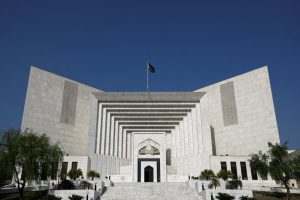The highest court in the land cannot invalidate existing legislation.
While the court is hearing Imran’s petition against the NAO changes, a government lawyer is arguing that the judiciary does not have the authority to declare a statute null and void.

ISLAMABAD: Justice Mansoor Ali Shah of the Supreme Court noted on Tuesday that judges, unlike lawmakers, took an oath to make decisions in accordance with the law rather than the nation’s national security, development, and prosperity. This was in response to a petition opposing the changes to the accountability law.
Imran Khan, the deposed prime minister and chairman of the Pakistan Tehreek-e-Insaf, filed a petition with the Supreme Court (SC) challenging the changes made by the current administration to the National Accountability Ordinance (NAO) 1999. The petition was heard by a three-judge special SC bench, led by Chief Justice of Pakistan Umar Ata Bandial and including Justices Ijazul Ahsan and Shah.
Makhdoom Ali Khan, an attorney for the federal government, asserted early on that there were no important questions raised in the petition that needed to be addressed.
He continued, “The judiciary, parliament, and executive must remain within their respective limitations when there is no other option.”
He said that although the judiciary was not given the ability to declare a law null and void by the Constitution, the SC had granted it that power through its ruling.
The attorney claimed that even in a court ruling, the authority to declare laws void was subject to conditions.
He mentioned that the revisions had also faced criticism for violating Islamic teachings.
He further stated that only the Federal Shariat Court (FST) could find a law to be against Islam.
Khan pointed out that the SC lacked the power to consider laws in the context of Shariah law.
He argued that the SC could not interfere with the power of parliament to enact laws.
The government’s attorney mentioned the US president as an example, who had the power to pardon felons.
He emphasised that regardless of whether the US president’s judgement was sound or not, the local judiciary had never gotten involved.
Khan pointed out that the petitioner has always had the burden of proof in the nation’s legal system since 1947.
He continued by saying that the SC had explicitly said in its rulings that courts could not contest the legislative objectives.
The CJP asked how many MPs were present when the modifications were voted while pointing out that a certain number of them have to be in the House to approve a legislation.
A bill has never been declared unlawful because a majority vote was not obtained, Khan retorted, adding that he will inform the SC of the precise number of lawmakers present in the House at that time.
The chief justice observed that the lawyer didn’t need to get worked up over it because it was simply an inquiry.
Every legislator, according to Khan, took an oath to make choices in accordance with the Constitution.
Justice Ahsan pointed out that the MPs’ oath required them to make decisions for the country’s progress, security, and betterment.
He questioned whether the lawmakers’ oath would be broken if a measure that went against these ideals was passed.
Khan emphasised that no judge could determine what the Parliament’s intentions were.
The sole distinction between the oaths of judges and parliamentarians, according to Justice Shah, is that the former were sworn in with the obligation to make decisions in accordance with the law.
Judges did not take an oath to make decisions for the country’s security, progress, and prosperity, he said.
Judges must make decisions in accordance with the Constitution and the law, the lawyer retorted.
He continued by saying that the legislation passed by the parliamentarians was seen as favouring the security, advancement, and improvement of the nation.
A US Supreme Court justice was quoted by Khan as saying that any “dumb” legislation might be passed by the legislature.
He continued by saying that a US court had ruled that even if their elected officials went to “hell,” the public would support them.
The case hearing was later postponed until Wednesday (today).










































